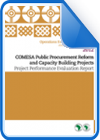Evaluation Team
This Project Performance Evaluation Report was prepared by Mr. Madhusoodhanan MAMPUZHASSERIL(Principal Evaluation Officer, OPEV.1), Mr. Girma Earo KUMBI (Senior Evaluation Officer, OPEV.2), and Mr. Mohamed Hassan TANI (Consultant).
Objective
The key objectives of the PPRP were to: (a) harmonise public procurement rules, regulations and procedures in COMESA; (b) improve national procurement systems and strengthen the capacity of COMESA member states in public procurement; and (c) enhance awareness of procurement opportunities in COMESA. The subsequent EPRCP aimed at further enhancing the public procurement systems of COMESA member states by modernising and harmonising the laws, regulations and procedures by strengthening their capacity to manage modern public procurement systems. The evaluation aimed to assess the results of the completed project and those of the ongoing project, as well as Bank and COMESA performance in designing and delivering the two projects.
Main Lessons
- Public procurement reforms aimed at regional integration and good governance will be more effective when addressed with a long-term perspective through the coordinated actions of key stakeholders (governments, political parties, electorate, media, civil society organisations, private sector and donor partners), and fine-tuned to the specific country contexts and challenges.
- While it is essential to focus on capacity building for public procurement systems, it is also imperative to build capacity for the private sector across the region to enable it to effectively participate in the public procurement process. Strong private sector organisations are required to provide overall support to private sector development to catalyse competitiveness.
- The complexity of the public procurementreform process at the regional level can only be addressed through long-term engagement and partnershipwith the governments in terms of continuous dialogue and capacity building. Complex policy reform issues cannot be fully addressed through short-term projects or technical assistance. Even when using a project approach, it is essential to have additional instruments and resource support for follow-up activities to ensure sustainability
- The achievement of procurement reform objectives at regional level necessitates effective implementation at national level. At the design stage and during implementation, it is important to build synergy with the ongoing and proposed governance and budget support projects of the Bank and with other development partners with complementary objectives.
Main Recommendations
Recommendation(s) to the Beneficiary:
- Ensure that the COMESA public procurement reforms initiated and enhanced through the PPRP and EPRCP will be further strengthened and expanded to member states that are lagging behind (namely Egypt, Libya, Eritrea and Zimbabwe). In addition to the, funding support from the Bank, COMESA should endeavour to mobilise resources from ,other development partners for financing the reform programme.
- Build capacity within the COMESA Secretariat to carry forward the procurement reforms so that the organisation will be able to continue dialogue with member states, take necessary follow-up measures and monitor procurement reforms in the region.
- Accelerate the implementation rate of the ongoing EPRCP especially in the final launching of the COMESA Procurement Management Information System (PROMIS) and the training of two website administrators for each country as envisaged in the project.
- Assist member states to develop a country level harmonised monitoring and evaluation system that would capture the progress made in the implementation and achievement of outcomes of procurement reforms; help COMESA to devise its own M&E system at the regional level. The countries are in the process of institutionalising modern public procurement systems and capacity building but currently there are no monitoring and evaluation systems in place to adequately measure the operational practice, the degree of compliance with enshrined rules and procedures, and the outcomes of the reform.
Recommendation(s) to the Bank:
- Provide sustained and enhanced support for public procurement reforms with a longterm ,perspective in order to consolidate gains from the PPRP and EPRCP and take forward the Bank’s leadership in this reform area and approach. A combination of financing instruments can be used by integrating the ‘regional’ and ‘national’ reform approaches. Now that the regional public procurement framework is in place, accelerated programme planning and funding support are required to address the shortfall within participating countries and to expand the programme to member countries that are lagging behind in reforms, with a focus on developing capacity for the public as well as private sectors.
- Engage the Bank’s Field Offices in reform projects in terms of policy dialogue and supervision. For such regional reform projects as the PPRP and the EPRCP, the Field Offices can play a significant role in policy dialogue and supervision. This support and follow up would enhance the reform process, taking into account the fact that the PIU supervised 19 countries using limited resources.
- Coordinate country procurement reform interventions for synergy. The COMESA procurement reform capacity building process should be coordinated with efforts initiated by the country and other development partners in this regard, for greater synergy. Projects of this nature should mutually benefit from the Bank’s programmes and those of other development partners with similar objectives as in Public Sector Financial Management Reforms. The Bank’s direct assistance to COMESA member states should be designed to build synergy with the regional public procurement reform programme.
- Support capacity building for M&E for procurement reforms. Most of COMESA member states’ oversight authorities neither have an established methodology nor systems to generate data for assessing procurement reforms. A few countries have received assistance from development partners to establish monitoring and evaluation methodology. The Bank should support the creation of a regional level monitoring and evaluation system which would draw from national M&E systems.
| Attachment | Size |
|---|---|
| 1.53 MB |


